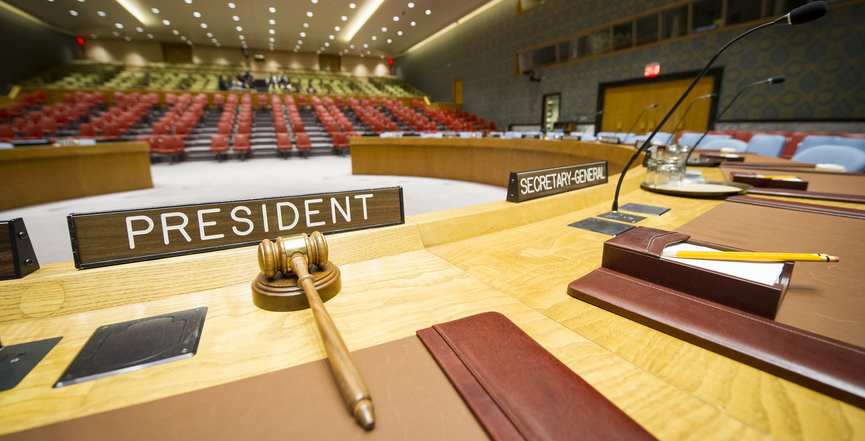Ottawa’s failure to gain a seat on the United Nations Security Council is a victory for those seeking a more just Canadian foreign policy. Spurred by the no Canada on Security Council campaign, the loss offers a unique opportunity to push for a fundamental reassessment of this country’s activities and relationships in every corner of our interconnected planet.
The Trudeau government’s defeat is simultaneously unsurprising and remarkable. As I detail here, the international community’s rejection of Canada’s bid for a seat on the Security Council is not a surprise, since Liberal foreign policy has largely mimicked that of Stephen Harper, who lost a similar bid in 2010.
Conversely, the victory is remarkable because Canada had many advantages over its competitors Ireland and Norway for the two “Western Europe and others” Security Council seats. It is a member of the G7 and has seats on the boards of the World Bank and the International Monetary Fund.
A member of the Commonwealth and Francophonie, Canada also speaks the two main colonial languages. Canada is richer than Ireland and Norway and, notwithstanding commentary suggesting otherwise, actually distributes more international “aid” (which is portrayed much too positively by liberal commentators). Canada spends about five times more on overseas development assistance than Ireland and a few hundred million dollars more than Norway. (Norway spends a great deal more as a percentage of its GDP on ODA, and Ireland contributes a slightly higher percentage.)
Canada has a far larger diplomatic apparatus than Ireland or Norway. In the lead-up to the UN vote, Canada’s diplomats published a slew of commentaries in international papers vaunting Canada’s ties to Namibia, Lebanon and others. Canadian diplomats across the globe also produced Security Council related videos and a Twitter campaign.
But, the #NoUNSC4Canada campaign effectively pushed back against the government’s international Twitter drive. Even if Canada had won the seat, I would have considered the No Canada on UN Security Council campaign a success since it generated significant critical discussion of foreign policy.
Launched formally a month ago (after a multi-month COVID-19 delay) with an open letter in the Toronto Star calling on countries to vote against Canada’s Security Council seat bid due to its militarism, support for controversial mining companies, anti-Palestinian positions and climate policies. The Canadian Press, Radio Canada and other major Canadian media outlets reported on the letter signed by numerous prominent individuals, including David Suzuki, Noam Chomsky, Pam Palmater and Roger Waters.
Many left Canadian media outlets published the letter and dozens of Spanish, French and English language international media outlets reported on the campaign. More than a half dozen videos, including one from Roger Waters and another from Quebec National Assembly member Ruba Ghazal, were produced in support of the effort.
Beyond highlighting immoral policies, the original Canadian Foreign Policy Institute open letter was signed by more than 30 organizations and 3,500 individuals. Another Just Peace Advocates letter asking UN ambassadors to vote for Ireland and Norway instead of Canada due to its anti-Palestinian positions was signed by more than 100 organizations and dozens of prominent individuals.
The all-volunteer campaign (bravo Karen Rodman, Bianca Mugyenyi, David Heap, David Kattenburg, Robert Assaly, Lorraine Guay, Tamara Lorincz and Arnold August) stimulated 1,299 individuals to deliver letters to every UN ambassador urging them to vote against Canada’s bid due to its anti-Palestinian record. Additionally, 485 individuals emailed all UN ambassadors with the general open letter; 169 individuals emailed Caribbean ambassadors with a statement critical of Canada’s role in the Caribbean; and 118 letters critical of Canada’s role on in Africa were sent to all ambassadors on that continent.
Two days before the vote, a #NoUNSC4Canada Twitter “storm” targeting UN ambassadors with messages opposed to Canada’s bid generated enough online chatter to be mentioned by Radio Canada.
Prime Minister Justin Trudeau and Foreign Affairs Minister François-Philippe Champagne were questioned directly about the campaign. In the clearest example of how the campaign disrupted the government’s bid, Canada’s ambassador to the UN, Marc-André Blanchard, delivered a letter to all countries’ permanent missions at the UN responding to the Palestine-focused effort.
It’s hard to gauge the impact the “no Canada on the Security Council” campaign had on the individuals who privately cast the ballots. But, Canada received fewer votes on Wednesday than in 2010.
Whether one views this failure to earn a Security Council seat as a victory or a loss, it is clearly time to fundamentally reassess Canadian foreign policy. A good place to begin is a broad discussion about whether this country’s international affairs should continue to be driven by Washington and corporate interests, or whether another sort of foreign policy is possible.
Please sign this petition calling for a fundamental reassessment of Canadian foreign policy.
Yves Engler is a Montreal-based writer and political activist.
Image: United Nations Photo/Flickr



